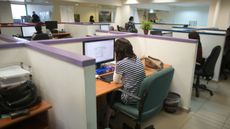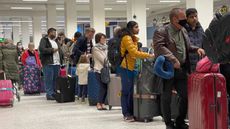Absence rates halve - is the day of the sickie over?
Number of people off work reduced by 50% in two decades

Absence rates among UK workers have halved over the past two decades, according to data from the Office for National Statistics.
The figures show that sickness absence rates among employees who were otherwise healthy fell to 1.1% last year, down from 2.2% in 1997.
Brits took 141.4 million days off work last year because of sickness or injury, equivalent to 4.4 days per worker, down from 7.2 per worker in the mid-1990s.
Subscribe to The Week
Escape your echo chamber. Get the facts behind the news, plus analysis from multiple perspectives.

Sign up for The Week's Free Newsletters
From our morning news briefing to a weekly Good News Newsletter, get the best of The Week delivered directly to your inbox.
From our morning news briefing to a weekly Good News Newsletter, get the best of The Week delivered directly to your inbox.
The Times says this could mark the end of the “sickie”, which it defines as “a trick pulled for years by committed slackers: at the first hint of a sniffle, phone the boss, put on a croaky voice and get back under the duvet”.
It also cites a generational dimension to this, pointing out that “despite well-worn tropes about snowflake millennials, experts said that the workforce was more committed to getting into the office since they joined its ranks”.
However, the Daily Mail sees things differently. It reports a “spike in the number of sick days taken by workers last year”, noting that the 141.4 million working days lost in the UK due to sickness and injury in 2018 was an increase of almost ten million sick days on 2017.
–––––––––––––––––––––––––––––––For a round-up of the most important stories from around the world - and a concise, refreshing and balanced take on the week’s news agenda - try The Week magazine. Get your first six issues for £6–––––––––––––––––––––––––––––––
Although it agrees that “over the longer term, workers appear to have either become more stoic - or become less prone to illness or injury”, it says last year’s increase in sick days is “a blow to businesses and the economy”.
However, Personnel Today notes that the average number of sick days per employee increased “only marginally” from 4.1 days in 2017 to 4.4 in 2018.
Paul Avis, marketing director at Canada Life Group Insurance, also warned of the dangers of presenteeism, when people come into work even when they are ill due to fears of losing their job.
“Presenteeism is entrenched in our society, costing us up to £26bn a year, and the explosion of workplace technology means the need to be ‘always on’ can have serious repercussions on the health and productivity of UK employees,” he said.
The most common reasons for taking time off work were a cough, cold or minor ailment (27%), back pain and similar problems (19.7%) and an accident or food poisoning (13.7%).
Create an account with the same email registered to your subscription to unlock access.
Sign up for Today's Best Articles in your inbox
A free daily email with the biggest news stories of the day – and the best features from TheWeek.com
-
 Can Trump get a fair trial?
Can Trump get a fair trial?Talking Points Donald Trump says he can't get a fair trial in heavily Democratic Manhattan as his hush money case starts
By Harold Maass, The Week US Published
-
 Crossword: April 24, 2024
Crossword: April 24, 2024The Week's daily crossword
By The Week Staff Published
-
 Sudoku hard: April 24, 2024
Sudoku hard: April 24, 2024The Week's daily hard sudoku puzzle
By The Week Staff Published
-
 Brain device could spot when you daydream at work
Brain device could spot when you daydream at workfeature And other stories from the stranger side of life
By Chas Newkey-Burden Published
-
 The Week Unwrapped: Russian visas, Arab fattism and quiet quitting
The Week Unwrapped: Russian visas, Arab fattism and quiet quittingpodcast Is Finland an unwilling backdoor to Europe? Has fat-shaming reached the Middle East? And are young workers really slacking off?
By The Week Staff Published
-
 ‘The four-day week experiment could establish a new norm’
‘The four-day week experiment could establish a new norm’Instant Opinion Your digest of analysis from the British and international press
By The best columns Published
-
 Home Office worker accused of spiking mistress’s drink with abortion drug
Home Office worker accused of spiking mistress’s drink with abortion drugSpeed Read Darren Burke had failed to convince his girlfriend to terminate pregnancy
By The Week Staff Published
-
 In hock to Moscow: exploring Germany’s woeful energy policy
In hock to Moscow: exploring Germany’s woeful energy policySpeed Read Don’t expect Berlin to wean itself off Russian gas any time soon
By The Week Staff Published
-
 Were Covid restrictions dropped too soon?
Were Covid restrictions dropped too soon?Speed Read ‘Living with Covid’ is already proving problematic – just look at the travel chaos this week
By The Week Staff Last updated
-
 Inclusive Britain: a new strategy for tackling racism in the UK
Inclusive Britain: a new strategy for tackling racism in the UKSpeed Read Government has revealed action plan setting out 74 steps that ministers will take
By The Week Staff Published
-
 ‘False narratives about how the NHS is coping are damaging’
‘False narratives about how the NHS is coping are damaging’Instant Opinion Your digest of analysis from the British and international press
By The best columns Published